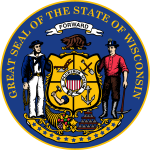| |||||||||||||||||||
93 delegates to the Democratic National Convention (77 pledged, 16 unpledged) The number of pledged delegates received is determined by the popular vote | |||||||||||||||||||
|---|---|---|---|---|---|---|---|---|---|---|---|---|---|---|---|---|---|---|---|
| |||||||||||||||||||
 Primary results by county Gore: 80–85% 85–90% 90–95% 95–100% | |||||||||||||||||||
| Elections in Wisconsin |
|---|
 |
| Pledged national convention delegates | |
|---|---|
| Type | Del. |
| CD1 | 5 |
| CD2 | 6 |
| CD3 | 6 |
| CD4 | 6 |
| CD5 | 6 |
| CD6 | 5 |
| CD7 | 6 |
| CD8 | 5 |
| CD9 | 5 |
| PLEO | 10 |
| At-large | 17 |
| Total pledged delegates | 77 |
The 2000 Wisconsin Democratic presidential primary took place on April 4, 2000 as part of the Democratic Party primaries for the 2000 presidential election. The Wisconsin primary was an open primary, with the state awarding 93 delegates to the 2000 Democratic National Convention, of which 77 were pledged delegates allocated on the basis of the results of the primary.
As of the primary on April 4, Vice president Al Gore and conspiracy theorist Lyndon LaRouche Jr. were the only candidates left in the race. Bradley had dropped out and suspended his campaign the previous month, leaving Gore as the party's presumed presidential nominee.[1] Nevertheless, Bradley continued to gain delegates at the national convention in subsequent later primary contests, but did not make the threshold in Wisconsin. Gore had ultimately won the primary with around 88% of the vote and all 77 pledged delegates, while Bradley, only received around 10% of the vote and 0 delegates.
- ^ "Bush, Gore Clinch Nominations". March 15, 2000. Retrieved September 13, 2023.


